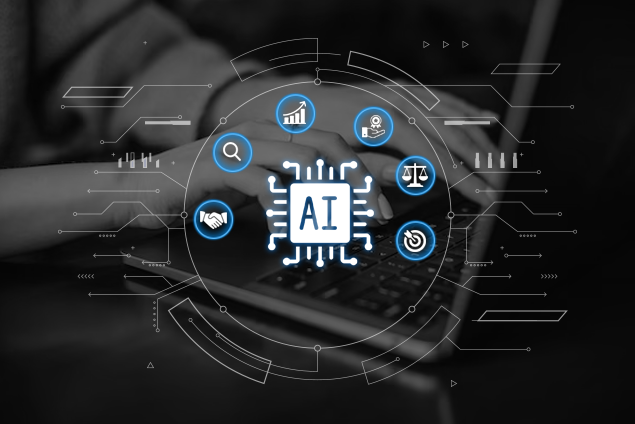Topics: Full Cycle Recruiting
A Deep Dive into the Impact of Automation in Full Cycle Recruiting
Posted on February 27, 2024
Written By
QX Global Group

In the rapidly evolving world of recruitment, the concept of full cycle recruiting remains paramount. For those at the helm of decision-making within the UK staffing sector, mastering the nuances of the full life cycle recruiting process is essential. Yet, the advent of Artificial Intelligence (AI) and automation heralds a transformative era, revolutionising the recruitment landscape.
Understanding Full Cycle Recruiting
Full cycle recruiting encapsulates the comprehensive journey of hiring, commencing with job requisition and spanning across candidate sourcing, screening, interviewing, and onboarding. The efficacy and effectiveness of this process are vital, directly influencing the calibre of hires and the overarching success of organisations. In a competitive market such as the UK’s, excellence in this domain is non-negotiable.
The Role of Automation in Full Cycle Recruiting
Automation is redefining recruitment, enabling the automation of repetitive and time-intensive tasks. This liberation allows recruiters to dedicate themselves to more strategic facets of their roles. Tools for job postings, resume screening, and initial candidate engagements are being automated, accelerating the recruitment process while enhancing accuracy and equity in candidate selection.
AI Revolutionising Recruitment
The impact of AI on recruitment is profound, with AI-powered tools bringing not just automation but also intelligence and analytical capabilities to the recruitment process. These tools analyse data to predict candidate suitability, identify patterns in successful hires, and assist in mitigating unconscious bias in hiring decisions.
As technology advances, businesses are progressively adopting recruitment automation to streamline their hiring procedures. While there are undeniable advantages to automating recruitment, it’s crucial to weigh up both the pros and cons before introducing this technology into your organisation.
Pros
- Faster and More Efficient Hiring Processes – Automation and artificial intelligence (AI) streamline several stages of the hiring process, from job posting to resume screening. This results in a significant reduction in the time it takes to fill positions, allowing companies to quickly address their workforce needs. Automated systems can operate 24/7, further enhancing efficiency.
- Improved Candidate Experience – Automated communication tools enable prompt responses to applicants, keeping them informed at every stage of the recruitment process. Personalised communication, although automated, can make candidates feel valued and improve their overall perception of the company. This not only enhances the candidate experience but can also positively impact the company’s employer brand.
- Reduction of Human Error and Bias – Traditional recruitment processes are susceptible to unconscious biases that can affect decision-making. Automation in resume screening and candidate selection helps minimise these biases by focusing on predefined criteria and qualifications, leading to a more fair and objective selection process.
- Data-Driven Hiring Decisions – The use of AI and machine learning algorithms allows companies to analyse vast amounts of data regarding candidate qualifications, past hiring outcomes, and employee performance. This analytical approach supports more informed and strategic hiring decisions, potentially improving the quality of hires and reducing turnover.
- Cost Savings – By automating routine tasks, companies can significantly reduce the labour and time traditionally required for recruitment. This not only speeds up the process but also translates into cost savings, as fewer human resources are needed for recruitment tasks, allowing them to focus on more strategic activities.
Cons
- Overlooking Qualified Candidates – Automated systems rely on specific criteria and algorithms to screen candidates. This can result in potentially qualified candidates being overlooked if their resumes do not precisely match the algorithmic requirements, such as non-traditional career paths or varied experiences that might not be easily quantifiable.
- Reinforcement of Biases – While automation can reduce human bias, it’s not immune to its own forms of bias. Algorithms are designed by humans and can inadvertently incorporate existing prejudices. If not carefully monitored and updated, these systems can perpetuate or even exacerbate biases.
- Decreased Human Interaction – The reduction in human contact throughout the recruitment process can detract from the candidate experience. Personal interaction plays a crucial role in assessing mutual fit and conveying the company culture, which automated processes might not fully capture. This can lead to a disconnect between candidates and the company, affecting their interest and engagement.
- Limitations in Assessing Soft Skills – Automated systems excel at evaluating hard skills and experience but often fall short in assessing soft skills such as teamwork, communication, and adaptability. These traits are crucial for determining cultural fit and long-term success within the company but are challenging to quantify through automation.
- Dependence on Technology – Heavy reliance on technology introduces risks related to system failures, glitches, or cyber attacks. These issues can disrupt the recruitment process and potentially compromise candidate data, leading to operational and reputational damage.
Conclusion
The integration of AI and automation in full cycle recruiting represents not just a trend but a strategic evolution within the UK staffing industry. It promises enhanced efficiency, more precise candidate matching, and a fortified recruitment process. As technology continues to advance, maintaining a competitive edge will be key to success in this challenging field.
FAQs:
Q1. What is the future of artificial intelligence in the recruitment process?
Ans: The future of AI in recruitment is incredibly promising. It is expected to bring more nuanced understanding of candidate data, predictive analytics for better hiring decisions, and enhanced candidate engagement strategies.
Q2. How is AI revolutionising recruitment?
Ans: AI is revolutionising recruitment by automating complex tasks, providing insights through data analysis, and enhancing the candidate experience through personalized interactions.
Q3. What is the implementation of AI in recruitment?
Ans: Implementing AI in recruitment involves integrating AI-driven tools for candidate sourcing, resume screening, predictive analytics, and even AI-powered interviewing technologies.
Originally published Feb 27, 2024 08:02:17, updated Feb 27 2024
Topics: Full Cycle Recruiting








